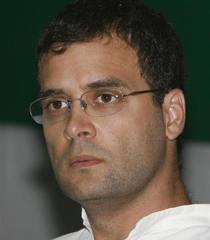 New Delhi, July 31: In a startling revelation, a former MLA of the Samajwadi Party has told the Supreme Court that his party leadership had egged him to file a PIL in the Allahabad high court in 2010 against Congress general secretary Rahul Gandhi accusing him of abduction and rape of an Amethi girl.
New Delhi, July 31: In a startling revelation, a former MLA of the Samajwadi Party has told the Supreme Court that his party leadership had egged him to file a PIL in the Allahabad high court in 2010 against Congress general secretary Rahul Gandhi accusing him of abduction and rape of an Amethi girl.
The HC, while dismissing the PIL, on March 7, 2011, had imposed a cost of Rs 50 lakh on petitioner Kishor Samrite and ordered a CBI probe against him. But, on appeal the apex court had on April 6, 2011, stayed the HC order and issued notices to the UP government and Gandhi.
Gandhi last Friday told the Supreme Court that accusations against him were false, malicious and baseless.
But, what made Samrite to strike back at SP was the affidavit filed by the Akhilesh Singh Yadav government terming him as a person who has lost his balance. Samrite said, "When the petitioner was called by senior leaders of the present ruling party (in the state) to file the writ petition, petitioner bona fide filed the writ petition."
"The state, in the changed political equation, is wanting to disown its actions and wash its hands and making a scapegoat of the petitioner," Samrite said and clarified that right from the beginning he had been taking a stand for inquiry into the alleged incident only and not for a probe against Gandhi.
The ex-MLA from Madhya Pradesh, who was elected on a SP ticket to the assembly from Lanji constituency in Balaghat district, said he was shocked to read the state's stand that "the petitioner is mentally imbalanced" and narrated the sequence of events leading to filing of the PIL in the HC in 2010.
Samrite said he was called to Delhi in 2010 "to meet the other senior leaders, who were in Delhi as the Parliament was in session, where he was apprised about the facts of the serious incident that had been reported from a village in UP and in view of the fact that he had taken up several public causes in the past he was requested to file a writ petition in the nature of PIL in the Allahabad High Court's Lucknow Bench. Thus, the writ petition came to be filed and notice was issued on it."
He said after he filed the appeal against the March 7, 2011, High Court order in the Supreme Court, he was interrogated by the CBI during which he had narrated the entire sequence of events leading to filing of the PIL in HC. "The same should form a part of the status report which the CBI desired to submit before the Supreme Court," he said.
Gandhi in his response to the Supreme Court's notice issued on April 6, 2011, on Samrite's petition, had said: "I emphatically deny the allegation of rape and detention of the writ petitioners by me and say that both these allegations are false, malicious and baseless and no cognizance could be taken by any responsible person of such allegations made on websites."
Gandhi had requested the court to take action against Samrite for filing a vexatious petition to harm his public image and give a political twist to the malicious allegation that that he had kidnapped the girl and her family.
The HC had asked for a CBI probe against Samrite on March 7. The CBI had lodged a case under Indian Penal Code Sections 120B (criminal conspiracy), 181 (false statement on oath), 211 (false charges to cause injury) and 499-500 (defamation). On Samrite's appeal, the SC had on April 6, 2011, stayed the HC order and issued notice to UP government and Gandhi.
The HC in its March 7 order had said, "We also direct the CBI director to register a case against Kishore Samrite and all other persons who are found involved in the plot, if any, hatched in order to defame Shri Rahul Gandhi, Member of Parliament from Amethi."






Comments
Add new comment